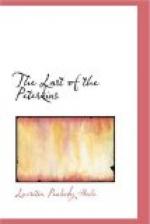Mr. Peterkin remembered he had heard something of the sort, but he did not suppose it had been kept up with the modern improvements.
Mrs. Peterkin felt that the thing must be very much exaggerated. She could not believe the whole country would be covered, or that everybody would leave; as summer was surely the usual time for travel, there must be strangers there, even if the natives left. She would not be sorry if there were fewer of the savages. As for the boats, she supposed after their long voyage they would all be used to going about in boats; and she had thought seriously of practising, by getting in and out of the rocking-chair from the sofa.
The family, however, wrote to the lady from Philadelphia, who had travelled in Egypt, and whose husband knew everything about Egypt that could be known,—that is, everything that had already been dug up, though he could only guess at what might be brought to light next.
The result was a very earnest recommendation not to leave for Egypt till the autumn. Travellers did not usually reach there before December, though October might be pleasant on account of the fresh dates.
So the Egypt plan was reluctantly postponed; and, to make amends for the disappointment to the little boys, an excursion for maple syrup was proposed instead.
Mr. Peterkin considered it almost a necessity. They ought to acquaint themselves with the manufactures of their own new country before studying those of the oldest in the world. He had been inquiring into the products of Egypt at the present time, and had found sugar to be one of their staples. They ought, then, to understand the American methods and compare them with those of Egypt. It would be a pretty attention, indeed, to carry some of the maple sugar to the principal dignitaries of Egypt.
But the difficulties in arranging an excursion proved almost as great as for going to Egypt. Sugar-making could not come off until it was warm enough for the sun to set the sap stirring. On the other hand, it must be cold enough for snow, as you could only reach the woods on snow-sleds. Now, if there were sun enough for the sap to rise, it would melt the snow; and if it were cold enough for sledding, it must be too cold for the syrup. There seemed an impossibility about the whole thing. The little boys, however, said there always had been maple sugar every spring,—they had eaten it; why shouldn’t there be this spring?
Elizabeth Eliza insisted gloomily that this was probably old sugar they had eaten,—you never could tell in the shops.
Mrs. Peterkin thought there must be fresh sugar occasionally, as the old would have been eaten up. She felt the same about chickens. She never could understand why there were only the old, tough ones in the market, when there were certainly fresh young broods to be seen around the farm-houses every year. She supposed the market-men had begun with the old, tough fowls, and so they had to go on so. She wished they had begun the other way; and she had done her best to have the family eat up the old fowls, hoping they might, some day, get down to the young ones.




